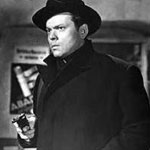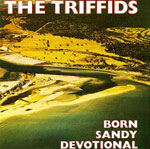
Next up is the Four Tet mix of Jamie Lidell’s ‘The City’, which comes from Warp’s ‘Additions’ 12” accompaniment to the excellent Multiply album of 2005. Living in the depths of the Devon countryside, I thought it was a nice ironic touch to have two songs called ‘The City’ in the mix this month. But Lidell’s couldn’t be further from the spirit of the Schengen number if it tried. Sure, both employ electronics, but Lidell’s use is altogether more unhinged, rooted less in electro-ambience and more in the deranged disco of, say, the late ‘70s and early ‘80s New York No Wave scene. Which is to be applauded of course.

The Karas track in fact kicks off a whole section of reissue action on my mix and is followed in quick succession by tracks from two more El packages. Firstly The Four King Cousins offer up their cover of Brian Wilson’s classic ‘God Only Knows’ which is surely one of the most perfectly formed pieces of art ever created. The Four King Cousins (daughters of the famous King Sisters) do it justice too, with a sublime sunshine pop harmony treatment that ranks up there with the likes of The Free Design and The Association. This comes from the classy David Axelrod produced Introducing… set from the late ‘60s, and is essential summer pop listening.
Then there’s the sound of The Hi-Lo’s, a vocal group from the ‘50s and early ‘60s who blended Doo-Wop, Jazz and Pop to create something that in turn would inspire and influence the likes of The Beach Boys, The Mamas and The Papas and Manhattan Transfer. The Listen! album was originally released in 1954 and is a glorious memento of a simpler time, when sophisticated, intellectual artistry dressed in suits and ties and sounded smooth and immensely seductive. And in light of the fact that time-travel seems as elusive as ever, records like this are the closest you’ll get to immersing yourself in that marvellous vibe. Oh and mine’s a Tom Collins, thanks for asking.

The Telescopes continue the drug theme with their ‘Perfect Needle’. Now I should say right away that I never really rated The Telescopes. They were a part of the Spacemen 3 / Loop axis of psychedelic rock in the late 1980s but I always found them lacking and anyway, of that scene it was really only Loop who were of interest to me as they immersed themselves in ever greater sonic experimentations. Their peers meanwhile seemed interested only in taking their risks with hard drugs. And whilst this, and the other tracks on the Taste set now sound divertingly, darkly pretty, they show The Telescopes to be nevertheless hopelessly rooted in a r’n’r drug mythology that was always bland and tedious at best.
Australia’s The Triffids were always heavily rooted in an r’n’r mythology too, but theirs was noticeably more intriguing and for me at least nodded at more intriguing reference points. There was something ineffably beguiling about the way in which they conjured the vastness of their homeland as well, and a song like ‘Wide Open Road’ always seemed to me to be a perfect Pop moment, joyously in tune with classic themes of loss and movement, effortlessly marrying evocation of geography with a sense of being thoroughly outside of time and place. The already much missed Grant McLennan’s ‘Cattle And Cane’ was rightly voted one of the ten finest Australian songs of all time, but I think that ‘Wide Open Road’ or any one of a dozen Triffids songs, could make an equally valid claim to being in that list. Indeed, there would be another nine songs merely from the Born Sandy Devotional set that ‘Road’ comes; each of them the sound of a group at the top of their game, a group in tune with their heritage yet making something new and startling from that melange of influences. The Triffids were always hopelessly, magnificently romantic, like Dylan obsessed souls searching for heaven in the light of the skies, the depths of the forest and the blacktop stretching into the distance. The Triffids were beautiful losers, Beat poets, soulful kids in search of the heart of song, and I loved them dearly. All of which means I cannot recommend highly enough the Domino sponsored series of reissues which this kicks off. Snap them up, play them loud in the summer heat and clutch the memories they spark to your heart forever.

There was always something of the epic about The Triffids, and there’s a similar echo of that in iLiKETRAiNS ‘Terra Nova’. Five minutes of simmering guitars and bohemian vocals, the single tells the story of Captain Scott’s doomed 1912 Antarctic expedition and is fittingly glacial and immense. iLiKETRAiNS seem to follow British Sea Power in mining a vein of intelligent, melodic atmospheric rock that brings to mind the likes of Kitchens Of Distinction, Crash and Ultra Vivid Scene. There is too an air of nostalgia for times gone by that goes beyond the obvious references of the songs (flip-side song ‘Fram’ concerns itself with the story of one Hjalmar Johansen, ousted from the celebrated Norwegian team that famously beat Scott and his men in their race to the Pole, whilst previous single ‘A Rook House For Bobby’ was about troubled chess grandmaster Bobby Fisher), one that conjours thoughts of July Skies’ and their beautiful takes on the memories of history stored in landscape and structure. That sense of history reverberates through the sound of iLiKETRAiNS, and it’s one that I look forward to hearing more of as their Progress, Reform mini-album follows this single in late June, again on Fierce Panda.
Now one of the records I somehow overlooked at the start of this year was Frances McKee’s gorgeous Sunny Moon album. In many ways I’m glad I did pass it over, as it’s now emerged as a perfect accompaniment to the early summer, and certainly on a track like ‘Childish Memories’ the former Vaselines member is capable of conjuring a folk sound infused with the delicate psychedelia of, say, David Roback and Kandra Smith in Opal.
Then finally, we close with the sound of Rita Lee’s ‘Amor Branco E Preto’ from the Hoje É O Primeiro Dia Do Resto Da Sua Vida collection, once again for Rev-Ola. With a totally Tropicalia sound, this early ’70s solo set saw former Os Mutantes vocalist Lee reunited with Arnaldo, Sergio Bapista and the sound of Brazilain psych-rock after an abortive stab at straight pop failed to set the charts alight. This set, however, is fantastic stuff, and with its exuberant sound of organised chaos could easily be seen as a fifth Os Mutantes album, with all that such a concept entails! Essential summer listening. Accept no substitute.
© 2006 Alistair Fitchett